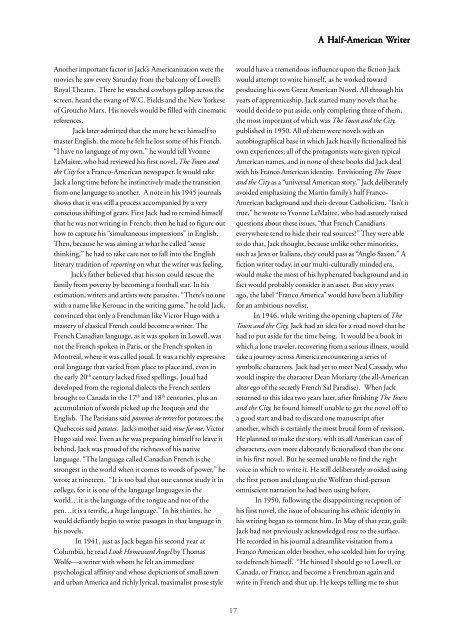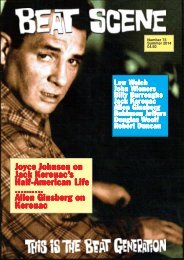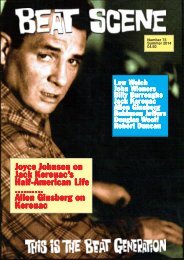You also want an ePaper? Increase the reach of your titles
YUMPU automatically turns print PDFs into web optimized ePapers that Google loves.
A Half-American<br />
Writer<br />
Another important factor in Jack’s Americanization were the<br />
movies he saw every Saturday from the balcony of Lowell’s<br />
Royal Theater. There he watched cowboys gallop across the<br />
screen, heard the twang of W.C. Fields and the New Yorkese<br />
of Groucho Marx. His novels would be filled with cinematic<br />
references.<br />
Jack later admitted that the more he set himself to<br />
master English, the more he felt he lost some of his French.<br />
“I have no language of my own,” he would tell Yvonne<br />
LeMaitre, who had reviewed his first novel, The Town and<br />
the City for a Franco-American newspaper. It would take<br />
Jack a long time before he instinctively made the transition<br />
from one language to another. A note in his 1945 journals<br />
shows that it was still a process accompanied by a very<br />
conscious shifting of gears. First Jack had to remind himself<br />
that he was not writing in French; then he had to figure out<br />
how to capture his “simultaneous impressions” in English.<br />
Then, because he was aiming at what he called “sense<br />
thinking,” he had to take care not to fall into the English<br />
literary tradition of reporting on what the writer was feeling.<br />
Jack’s father believed that his son could rescue the<br />
family from poverty by becoming a football star. In his<br />
estimation, writers and artists were parasites. “There’s no one<br />
with a name like Kerouac in the writing game,” he told Jack,<br />
convinced that only a Frenchman like Victor Hugo with a<br />
mastery of classical French could become a writer. The<br />
French Canadian language, as it was spoken in Lowell, was<br />
not the French spoken in Paris, or the French spoken in<br />
Montreal, where it was called joual. It was a richly expressive<br />
oral language that varied from place to place and, even in<br />
the early 20 th century lacked fixed spellings. Joual had<br />
developed from the regional dialects the French settlers<br />
brought to Canada in the 17 th and 18 th centuries, plus an<br />
accumulation of words picked up the Iroquois and the<br />
English. The Parisians said pommes de terres for potatoes; the<br />
Quebecois said patates. Jack’s mother said mue for me; Victor<br />
Hugo said moi. Even as he was preparing himself to leave it<br />
behind, Jack was proud of the richness of his native<br />
language. “The language called Canadian French is the<br />
strongest in the world when it comes to words of power,” he<br />
wrote at nineteen. “It is too bad that one cannot study it in<br />
college, for it is one of the language languages in the<br />
world…it is the language of the tongue and not of the<br />
pen…it is a terrific, a huge language.” In his thirties, he<br />
would defiantly begin to write passages in that language in<br />
his novels.<br />
In 1941, just as Jack began his second year at<br />
Columbia, he read Look Homeward Angel by Thomas<br />
Wolfe—a writer with whom he felt an immediate<br />
psychological affinity and whose depictions of small town<br />
and urban America and richly lyrical, maximalist prose style<br />
would have a tremendous influence upon the fiction Jack<br />
would attempt to write himself, as he worked toward<br />
producing his own Great American Novel. All through his<br />
years of apprenticeship, Jack started many novels that he<br />
would decide to put aside, only completing three of them,<br />
the most important of which was The Town and the City,<br />
published in 1950. All of them were novels with an<br />
autobiographical base in which Jack heavily fictionalized his<br />
own experiences; all of the protagonists were given typical<br />
American names, and in none of these books did Jack deal<br />
with his Franco American identity. Envisioning The Town<br />
and the City as a “universal American story,” Jack deliberately<br />
avoided emphasizing the Martin family’s half Franco-<br />
American background and their devout Catholicism. “Isn’t it<br />
true,” he wrote to Yvonne LeMaitre, who had astutely raised<br />
questions about these issues, “that French Canadians<br />
everywhere tend to hide their real sources?” They were able<br />
to do that, Jack thought, because unlike other minorities,<br />
such as Jews or Italians, they could pass as “Anglo Saxon.” A<br />
fiction writer today, in our multi-culturally minded era,<br />
would make the most of his hyphenated background and in<br />
fact would probably consider it an asset. But sixty years<br />
ago, the label “Franco America” would have been a liability<br />
for an ambitious novelist.<br />
In 1946, while writing the opening chapters of The<br />
Town and the City, Jack had an idea for a road novel that he<br />
had to put aside for the time being. It would be a book in<br />
which a lone traveler, recovering from a serious illness, would<br />
take a journey across America encountering a series of<br />
symbolic characters. Jack had yet to meet Neal Cassady, who<br />
would inspire the character Dean Moriarty (the all-American<br />
alter ego of the secretly French Sal Paradise). When Jack<br />
returned to this idea two years later, after finishing The Town<br />
and the City, he found himself unable to get the novel off to<br />
a good start and had to discard one manuscript after<br />
another, which is certainly the most brutal form of revision.<br />
He planned to make the story, with its all American cast of<br />
characters, even more elaborately fictionalized than the one<br />
in his first novel. But he seemed unable to find the right<br />
voice in which to write it. He still deliberately avoided using<br />
the first person and clung to the Wolfean third-person<br />
omniscient narration he had been using before.<br />
In 1950, following the disappointing reception of<br />
his first novel, the issue of obscuring his ethnic identity in<br />
his writing began to torment him. In May of that year, guilt<br />
Jack had not previously acknowledged rose to the surface.<br />
He recorded in his journal a dreamlike visitation from a<br />
Franco American older brother, who scolded him for trying<br />
to defrench himself. “He hinted I should go to Lowell, or<br />
Canada, or France, and become a Frenchman again and<br />
write in French and shut up. He keeps telling me to shut<br />
17





